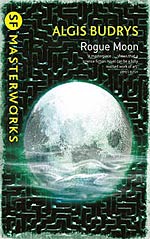
![]() Emil
Emil
1/19/2011
![]()
On the moon there's this mysterious, maze-like alien artifact that can only be explored by the transmission of bodily duplicates of individuals to the moon. The duplicates die, usually within seconds upon entering the artifact. The original person back on Earth experiences the deaths of their selves and this ordeal, naturally, drives them completely insane. Al Barker, risk-taker extraordinaire, is the only man who seems to be immune to the traumatic effects of witnessing his own deaths. And every time he does so, he progresses deeper into the artifact, carefully noting and charting each killing point. While the purpose of the artifact is never revealed, Barker eventually goes through it, justifying his persevering courage and faith in the science of Edward Hawks, the clever man who created the technology to transmit the duplicates to the moon.
I was reminded of Roadside Picnic, which also featured the idea of a heterotopian space completely at odds with the safety of the accustomed human world and only ventured into by those seeking psychological or material benefits that would not otherwise be accessible to them. Arguably Gateway falls within the same trope, expressing a conception of the dangerous but rewarding "other" space.
The image of the enigmatic alien artifact, the purpose of which is never explained - as with the mysteries of the Heechies in Gateway or the unexplained existence of the Zone in Roadside Picnic - the almost deranged determination with which Barker repeatedly "resurrects" himself, and Hawk's own unyielding belief on the power of the human mind to overcome obstacles makes this a gripping read. It's analysis of the complicated psychologies of the central characters is unsurpassed, showing a depth unknown unheard of at the time.
However, in today's term, these characters now come across as a bit stereotypical. They all have neuroses so deeply welded to their personalities that they come off like fetishists. And despite failure after failure, we never see them change, except for Hawks who in the end managed to find it within himself to care about someone else more than himself or his job. I also found the Conninton-Barker-Claire traingle a misplaced and weak stroyline with the whole book. They are an unlikable bunch, as if they are contentious just for the sake of being so. But as a part commentary on how people's personalities tend to drive them to do stupid things to get noticed, Budrys succeeds brilliantly. The reader can't help but to wonder if there is a real distinction between reckless abandonment and courage.
Typical as an exponents of humanistic literature, it demands that humans triumph. Here, like in Gateway and Roadside Picnic, we see that the alien artifact is somehow transformed into a commercial or military opportunity. There is no other real point to it but to be tamed. And humans can do that.
The book is a good read, but not nearly as great as many studious commentators would like us to believe.